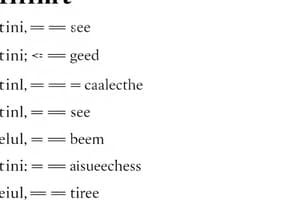Podcast
Questions and Answers
Which of the following best describes the use of infinitive clauses introduced with 'only to'?
Which of the following best describes the use of infinitive clauses introduced with 'only to'?
- To indicate the speaker's honesty.
- To explain a false impression.
- To sum up a proposal.
- To emphasize surprise or disappointment. (correct)
The infinitives of see and hear are often used to explain the reason for a ______ impression.
The infinitives of see and hear are often used to explain the reason for a ______ impression.
false
Infinitive phrases like 'to be honest' primarily serve to provide additional factual information.
Infinitive phrases like 'to be honest' primarily serve to provide additional factual information.
False (B)
Which sentence demonstrates the correct usage of a participle clause after a noun?
Which sentence demonstrates the correct usage of a participle clause after a noun?
What is the function of participle clauses that begin with verbs such as 'be', 'have', 'wish', and 'know'?
What is the function of participle clauses that begin with verbs such as 'be', 'have', 'wish', and 'know'?
Match the following sentence beginnings with the most appropriate completion to create grammatically correct sentences using participle clauses:
Match the following sentence beginnings with the most appropriate completion to create grammatically correct sentences using participle clauses:
In the sentence, 'Looking out of the window of our hotel room, the mountains were covered with snow,' what grammatical error is present?
In the sentence, 'Looking out of the window of our hotel room, the mountains were covered with snow,' what grammatical error is present?
Sentences beginning with participles like 'Generally speaking' are considered grammatically incorrect.
Sentences beginning with participles like 'Generally speaking' are considered grammatically incorrect.
When a participle clause has its own subject, it often expresses ______ circumstances.
When a participle clause has its own subject, it often expresses ______ circumstances.
Which of the following sentences correctly uses a participle clause with its own subject?
Which of the following sentences correctly uses a participle clause with its own subject?
Participle clauses can only be used after subordinating conjunctions, but not after prepositions.
Participle clauses can only be used after subordinating conjunctions, but not after prepositions.
Which of the following prepositions can be followed by an '-ing' clause?
Which of the following prepositions can be followed by an '-ing' clause?
After what conjunctions are clauses with past participles possible?
After what conjunctions are clauses with past participles possible?
The structure object + participle (clause) is employed following verbs related to ______.
The structure object + participle (clause) is employed following verbs related to ______.
In which sentence is the participle clause used correctly as an object complement?
In which sentence is the participle clause used correctly as an object complement?
Which sentence demonstrates the use of an infinitive clause to indicate what somebody found out at the end of a task?
Which sentence demonstrates the use of an infinitive clause to indicate what somebody found out at the end of a task?
The main purpose of using 'to be honest' at the beginning of a sentence is to provide background information.
The main purpose of using 'to be honest' at the beginning of a sentence is to provide background information.
Which sentence uses a participle clause after a noun?
Which sentence uses a participle clause after a noun?
Match the sentence beginnings to their best continuation:
Match the sentence beginnings to their best continuation:
An adverbial participle clause has a different subject from the main clause, it is called a ______ participle.
An adverbial participle clause has a different subject from the main clause, it is called a ______ participle.
The sentence 'Being French, it's surprising that she's such a terrible cook' is grammatically incorrect because of the dangling participle.
The sentence 'Being French, it's surprising that she's such a terrible cook' is grammatically incorrect because of the dangling participle.
Which of the following sentences uses a participle clause with its own subject correctly, introduced by 'with'?
Which of the following sentences uses a participle clause with its own subject correctly, introduced by 'with'?
Which of the following conjunctions can be followed by a clause with past participle?
Which of the following conjunctions can be followed by a clause with past participle?
In the sentence "I found her drinking my whisky", 'drinking my whisky' acts as an adverb modifying 'found'.
In the sentence "I found her drinking my whisky", 'drinking my whisky' acts as an adverb modifying 'found'.
Give an example of a verb of sensation that commonly takes the structure object + participle (clause).
Give an example of a verb of sensation that commonly takes the structure object + participle (clause).
Flashcards
I arrived home to find...
I arrived home to find...
Infinitive clauses indicate a discovery or learning at the end of a journey or task.
To hear her talk, you'd think...
To hear her talk, you'd think...
Infinitives with 'see' or 'hear' explain a false impression, usually followed by 'you'd think'.
To be honest...
To be honest...
Infinitive phrases that express the speaker's attitude or purpose.
Participle clauses structures
Participle clauses structures
Signup and view all the flashcards
Participle clauses after nouns.
Participle clauses after nouns.
Signup and view all the flashcards
Putting down my paper, I...
Putting down my paper, I...
Signup and view all the flashcards
Misrelated participles
Misrelated participles
Signup and view all the flashcards
Participle clauses with their own subjects
Participle clauses with their own subjects
Signup and view all the flashcards
Participle clauses after conjunctions
Participle clauses after conjunctions
Signup and view all the flashcards
Object complements
Object complements
Signup and view all the flashcards
Study Notes
Infinitives: Other Uses
- Infinitive clauses indicate findings or learnings at the conclusion of a journey or task.
- "I arrived home to find that the house had been broken into" demonstrates this use.
- Surprise or disappointment is intensified with "only."
- "At last we got to Amy's place, only to discover that she was away" exemplifies this.
- "He spent four years studying, only to learn that there were no jobs" is a further case.
- The infinitives of "see" and "hear" explain the basis for a false impression.
- After this infinitive, it is typical to use "you'd think" or a similar phrase.
- "To see them, you'd think they were married. But they only met yesterday" illustrates this structure.
- "To see him walk down the street, you'd never know he was blind" is another example.
- "To hear her talk, you'd think she was made of money" provides a further instance.
- Certain infinitive phrases communicate the speaker's stance or intent.
- "To be honest, I think you're making a mistake" shows this use.
- "To tell the truth, I'm not sure what to do now" is another example.
- "To sum up, I think we all accept John's proposal" demonstrates this function.
- "To put it another way, we're spending more than we're earning" is a further illustration.
Participle Clauses
- Participles combine with other words in clauses, conveying active or passive meanings.
- An example of active meaning is: "There's a woman crying her eyes out over there"
- An example of passive meaning is: "Most of the people invited to the reception were old friends"
- "Not knowing what to do, I telephoned the police" shows the structure in active meaning.
- "Served with milk and sugar, it makes a delicious breakfast" shows the structure in the passive meaning.
- "Who's the old man sitting in the corner?" is another usage example.
- "Rejected by society, he decided to become a monk" exemplifies passive use.
- Participle clauses can follow after nouns and pronouns.
- "We can offer you a job cleaning cars"
- "There's Neville, eating as usual."
- "In came the first runner, closely followed by the second."
- "I found him sitting at a table covered with papers" provides an example.
- The "reduced relative clauses" are participle clauses.
- "Who's the girl dancing with your brother?" is the same as "the girl who is dancing..."
- "Anyone touching that wire will get a shock" is the same as "Anyone who touches..."
- "Half of the people invited to the party didn't turn up" is the same as "who were invited..."
- Perfect participles are infrequently used.
- It is better to say "Do you know anybody who’s lost a cat" instead of "Do you know anybody having lost a cat?"
- Participle clauses function similarly to adverbial clauses, expressing condition, reason, time, result, etc.
- This is effective when the meaning is clear without needing a conjunction.
- Adverbial participle clauses tend to be formal.
- "Used economically, one can will last for six weeks" is equal to "If it is used..."
- "Having failed my medical exams, I took up teaching" is equal to "As I had failed..."
- "Putting down my newspaper, I walked over to the window" is equal to "After I had put down my newspaper..."
- "It rained for two weeks on end, completely ruining our trip" is equal to "so that it completely ruined our trip."
- "-ing" clauses use verbs like be, have, wish, and know; typically these are not progressive tenses.
- Such clauses usually indicate reason or cause.
- "Being unable to help in any other way, I gave her some money" shows reason or cause.
- "Not wishing to continue my studies, I decided to become a dress designer" also shows the reason or cause.
- "Knowing her pretty well, I realised something was wrong" also shows the reason or cause.
Misrelated Participles
- In adverbial clauses, the subject is typically the same as the main clause.
- "My wife had a talk with Sophie, explaining the problem" implies that "My wife" is the subject of explaining.
- Sentences with misrelated participles, also known as 'dangling participles,' are often considered incorrect when the adverb clause's subject differs from the main clause.
- "Looking out of the window of our hotel room, the mountains were covered with snow" is an example which could suggest the mountains are looking out the window.
- "Wrapped in red and gold gift paper, I delivered the parcel to my girlfriend" exemplifies this.
- Sentences with preparatory it or there as a subject, can still sound natural.
- "Being French, it's surprising that she's such a terrible cook"
- "Having so little time, there was not much that I could do."
- Some expressions referring to the speaker's attitude are misrelated participles and normal.
- "Generally speaking, men can run faster than women" provides an example.
- "Broadly speaking, dogs are more faithful than cats."
- "Judging from his expression, he's in a bad mood."
- "Considering everything, it wasn't a bad year."
- "Supposing there was a war, what would you do?"
- "Taking everything into consideration, they ought to get another chance."
Participle Clauses With Their Own Subjects
- A participle clause can include its own subject, usually in formal writing.
- "Nobody having any more to say, the meeting was closed" showcases this.
- "All the money having been spent, we started looking for work."
- "A little girl walked past, her doll dragging behind her on the pavement."
- "Hands held high, the dancers circle to the right."
- The subject is often introduced when the clause expresses accompanying circumstances.
- "A car roared past with smoke pouring from the exhaust."
- "With Daniel working in Birmingham, and Lucy travelling most of the week, the house seems pretty empty."
Participle Clauses After Conjunctions and Prepositions
- Clauses with "-ing" are used after after, before, since, when, while, on, without, instead of, in spite of, and as.
- "After talking to you I always feel better."
- "After having annoyed everybody he went home."
- "Switch off printer before replacing roller."
- "She's been quite different since coming back from America."
- "When telephoning from abroad, dial 1865, not 01865."
- "On being introduced, British people often shake hands."
- "They left without saying goodbye."
- "She struck me as being a very nervy kind of person."
- Clauses are mainly formal with past participles after if, when, while, once, and until.
- "If asked to look after luggage for someone else, inform police at once."
- "When opened, consume within three days."
- "Once deprived of oxygen, the brain dies."
- "Leave in oven until cooked to a light brown colour."
Object Complements
- Verbs of sensation (see, hear, feel, watch, notice, smell) and other verbs (find, get, have, make) follow the pattern object + participle (clause).
- "I saw a small girl standing in the goldfish pond." follows this pattern.
- "Have you ever heard a nightingale singing?" follows this pattern.
- "I found her drinking my whisky." follows this pattern.
- "We’ll have to get the car repaired before Tuesday" follows this pattern.
- "Do you think you can get the radio working?" follows this pattern.
- "We’ll soon have you walking again" follows this pattern also.
- "I can make myself understood pretty well in English" follows this pattern al
Studying That Suits You
Use AI to generate personalized quizzes and flashcards to suit your learning preferences.




